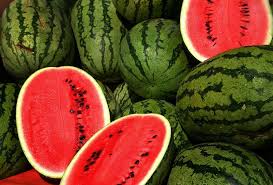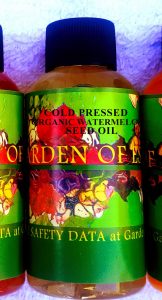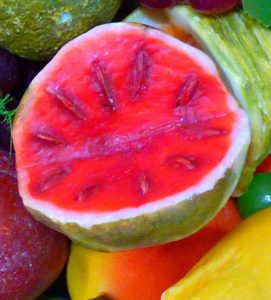 Much scientific study is currently being done re reducing prostate enlargement, by ingesting Watermelon Seed Oil. In fact, it is recommended that if you would like to derive any of the above health benefits, you should ingest one teaspoon in the morning, and one teaspoon at night. Or simply pour the oil, unheated, over your meals.
Much scientific study is currently being done re reducing prostate enlargement, by ingesting Watermelon Seed Oil. In fact, it is recommended that if you would like to derive any of the above health benefits, you should ingest one teaspoon in the morning, and one teaspoon at night. Or simply pour the oil, unheated, over your meals.
Watermelon seeds, contain citrulline, a non-essential amino acid that converts into the amino acid L-arginine when eaten. Citrulline acts as an antioxidant, as well as a vasodilator, according to the USDA.
Laboratory experiments on animals, proved that Watermelon Seed Oil (Citrullus lanatus) was able to reduce the size of the prostate, in only a few weeks.
 The experiments used MECLS (Methyl Extract) of Watermelon Seed Oil, but a far purer version is the Cold Pressed Watermelon Seed Oil, which contains none of the toxic methyl.
The experiments used MECLS (Methyl Extract) of Watermelon Seed Oil, but a far purer version is the Cold Pressed Watermelon Seed Oil, which contains none of the toxic methyl.
 Citrulline is an amino acid that is commonly converted by our kidneys and other organ systems into arginine (an amino acid). The only way to benefit from this amazing discovery, is to ingest Watermelon Seed Oil, because, otherwise, you would have to ingest thousands of watermelon seeds, to derive the same benefit.
Citrulline is an amino acid that is commonly converted by our kidneys and other organ systems into arginine (an amino acid). The only way to benefit from this amazing discovery, is to ingest Watermelon Seed Oil, because, otherwise, you would have to ingest thousands of watermelon seeds, to derive the same benefit.“In addition, watermelon has been widely used as a medicinal plant in African and Asian cultures due to the presence of several compounds with phytochemical activities [2]. Watermelon seeds have strong antioxidant activity [3,4], and due to their diuretic and purgative activity, have also been used in the treatment of gastrointestinal diseases [5], urinary infections [6], gonorrhea, leukorrhea [7] and prostatic hyperplasia [8]. Watermelon seed oils are classified as high quality oils due to the presence of x-3 and x-6 fatty acids [9] and phenolic compounds such as gallic, protocatechuic, p-hydroxybenzoic, vanillic, caffeic, syringic, p-coumaric and ferulic acids [10] .”
Furthermore, I choose the Cold Pressed Watermelon Seed Oil over the Methanol-extracted Watermelon Seed Oil, as it is chemical free, and yields far purer compounds.
Many scholarly articles discuss these issues:
Scientific studies on watermelon extract.
A variety of peer reviewed studies on watermelon extract and prostate size.